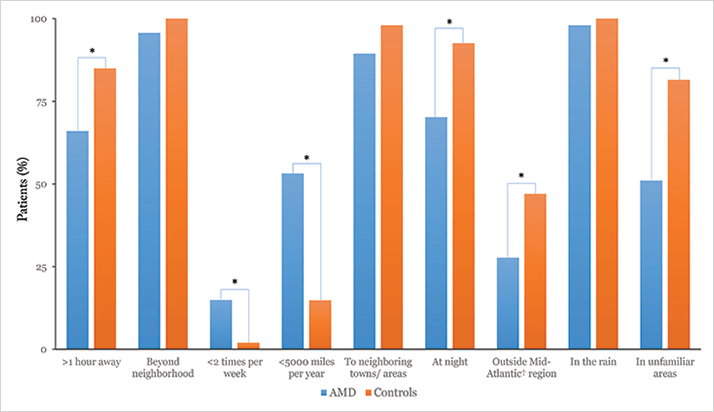
For many people in the USA (and elsewhere), a car is essential to live a normal life: it represents independence. Studies have shown that elderly people who have their ability to drive limited or removed experience “increased dependence, reduced accessibility to healthcare and higher mortality.” This prompted Sabyasachi Sengupta and colleagues at the Wilmer Eye Institute in Baltimore, MD, USA to ask if elderly Americans with central vision loss are tempted to continue driving and, if they are, under what conditions. Do they restrict their driving? If another driver is available, do they let that person drive?
The evaluation questionnaire was completed by sixty-four patients with bilateral vision loss (<20/32 in the better eye) or severe unilateral vision loss (<20/200) from age-related macular degeneration (AMD), and fifty-eight normally-sighted controls (with glaucoma), aged between 60 and 80 years (1). Driving limitations were specified by the investigators as: restricting their driving to the neighbourhood or familiar areas; reducing the frequency or distance of driving, or not driving when it’s at night or in the rain.
What they found (Figure 1) was that most patients with AMD continue to drive; indeed only one-fourth of patients with AMD-related central vision loss reported ceasing driving altogether. However, an increasing proportion of patients restricted their driving as their vision and contrast-sensitivity worsened. The patients were generally willing to let others drive when possible and they did restrict where, when and how far they drove. The authors write that it “appears that patients adjust to central vision loss by altering their driving habits, rather than ceasing driving altogether.”
Thus, patients maintain their quality of life for the longest possible time, but whether their actions strike a fair balance between safety and independence is another matter entirely.
References
- S Sengupta, SW van Landingham, SD Solomon, et al., “Driving Habits in Older Patients with Central Vision Loss”, Ophthalmology (2013), Epub ahead of print.
